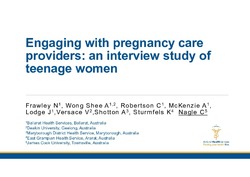Please use this identifier to cite or link to this item:
http://hdl.handle.net/11054/1225Full metadata record
| DC Field | Value | Language |
|---|---|---|
| dc.contributor | Frawley, Natasha | en_US |
| dc.contributor | Wong Shee, Anna | en_US |
| dc.contributor | Robertson, Carolyn | en_US |
| dc.contributor | McKenzie, AnneMarie | en_US |
| dc.contributor | Lodge, Julie | en_US |
| dc.contributor | Versace, Vincent | en_US |
| dc.contributor | Shotton, A. | en_US |
| dc.contributor | Sturmfels, K. | en_US |
| dc.contributor | Nagle, Cate | en_US |
| dc.date.accessioned | 2018-09-24T23:38:36Z | - |
| dc.date.available | 2018-09-24T23:38:36Z | - |
| dc.date.issued | 2018 | - |
| dc.identifier.govdoc | 01198 | en_US |
| dc.identifier.uri | http://hdl.handle.net/11054/1225 | - |
| dc.description.abstract | Background: Teenage pregnancy is associated with a large societal and personal burden, worldwide. The rate of teenage pregnancy at Ballarat Health Services (14.2/1000 births) was higher than the Victorian average of 10/1000 births. Attendance for pregnancy care is associated with improved outcomes. The aim of this study was to explore the barriers and facilitators to engagement with pregnancy care providers experienced by teenage women. Method: Between Feb-Jun 2017 semi structured interviews were conducted with women from Ballarat, Ararat and Maryborough health services who were pregnant aged ≤ 19 yrs. Interviews were audio taped and professionally transcribed. Thematic analysis was undertaken. Findings: Transcripts of 16 women were analysed and four themes emerged: Valuing pregnancy care, Access, Individualised care and Resilience, Young women were motivated to attend to ensure the wellbeing of their baby and lack of engagement occurred when the importance of care was not understood. Flexibility of appointments and a central location was important; most participants were highly reliant on others for transport. Continuity of carer was valued and the interpersonal skills of staff was keenly noted. Many women had fractured families and pregnancy led to a contraction of their social world yet there was a sense of purpose in their lives. Conclusions: These findings have informed the development of best practice for teenage pregnancy care. | en_US |
| dc.description.provenance | Submitted by Gemma Siemensma (gemmas@bhs.org.au) on 2018-09-24T23:38:18Z No. of bitstreams: 0 | en |
| dc.description.provenance | Approved for entry into archive by Gemma Siemensma (gemmas@bhs.org.au) on 2018-09-24T23:38:36Z (GMT) No. of bitstreams: 0 | en |
| dc.description.provenance | Made available in DSpace on 2018-09-24T23:38:36Z (GMT). No. of bitstreams: 0 Previous issue date: 2018 | en |
| dc.title | Engaging with pregnancy care providers: an interview study of teenage women. | en_US |
| dc.type | Conference | en_US |
| dc.type.specified | Presentation | en_US |
| dc.bibliographicCitation.conferencedate | March 25-28th | en_US |
| dc.bibliographicCitation.conferencename | PSANZ2018 – Perinatal Society of Australia and New Zealand Annual Scientific Meeting | en_US |
| dc.bibliographicCitation.conferenceplace | Auckland, New Zealand | en_US |
| dc.subject.healththesaurus | TEENAGE PREGNANCY | en_US |
| dc.subject.healththesaurus | BARRIERS | en_US |
| dc.subject.healththesaurus | CARE PLANS | en_US |
| dc.subject.healththesaurus | ANTENTAL CARE | en_US |
| dc.subject.healththesaurus | REGIONAL HOSPITAL | en_US |
| dc.subject.healththesaurus | RURAL HEALTH | en_US |
| Appears in Collections: | Research Output | |
Files in This Item:
| File | Description | Size | Format | |
|---|---|---|---|---|
| PSANZ_TeenagePregnancy project.pdf | 100.06 kB | Adobe PDF |  View/Open |
Items in DSpace are protected by copyright, with all rights reserved, unless otherwise indicated.
